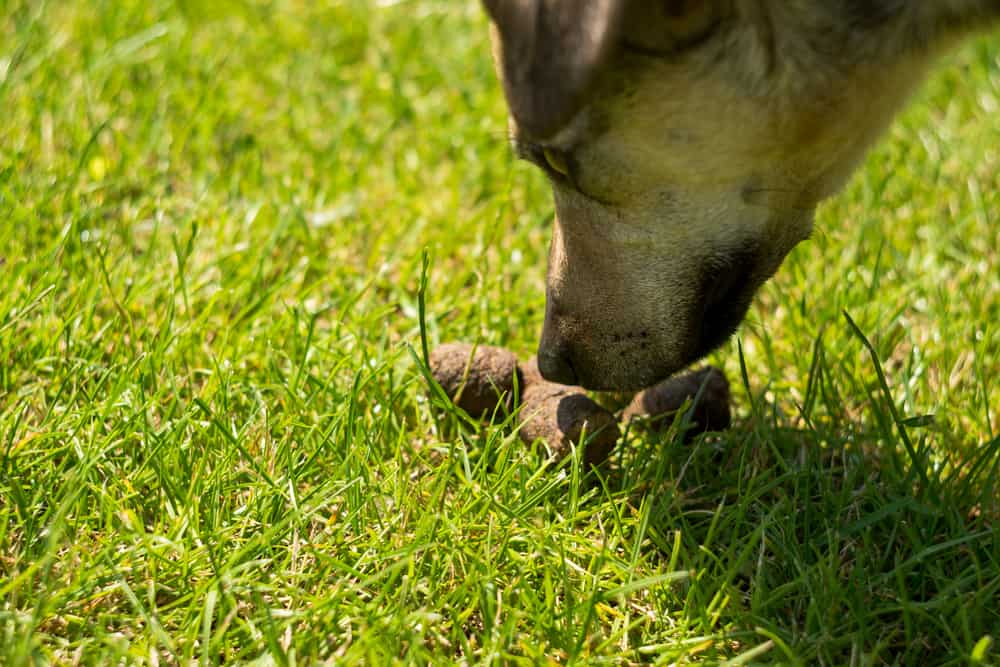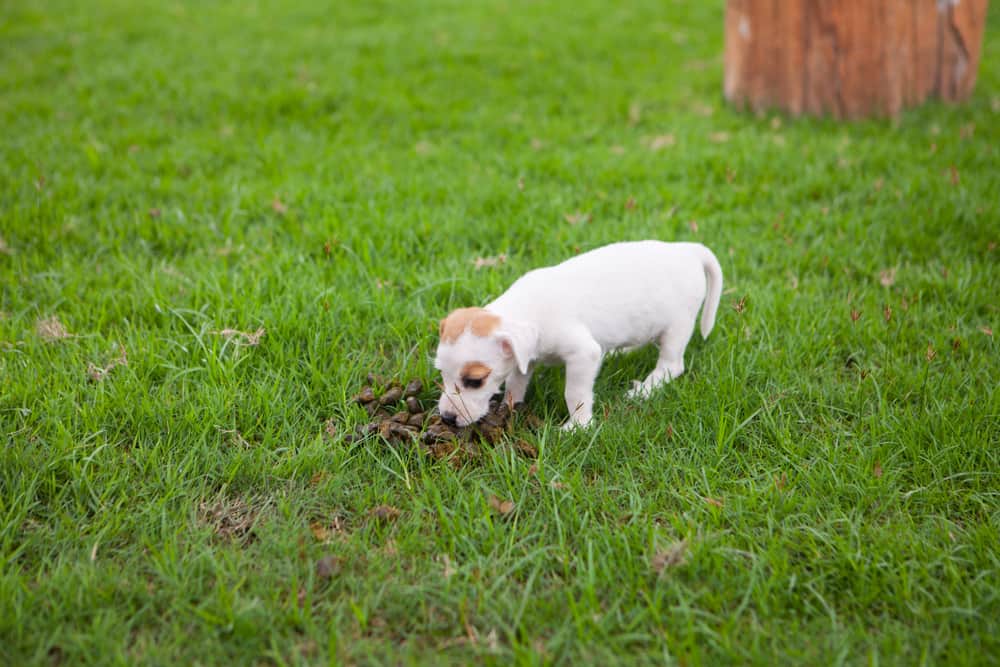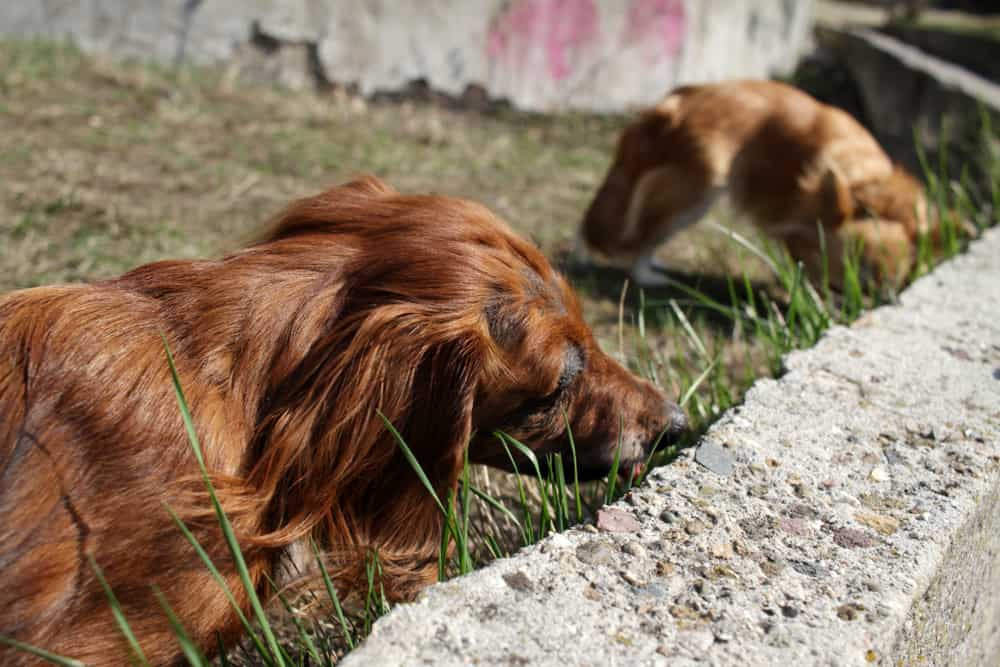Of all the behavioral problems that dogs can develop, few are more distressing – or downright disgusting – than when they eat poop. Humans have evolved to have a visceral aversion to excrement, so when our furry friends start munching it down, it makes us feel sick.
Understandably, then, pet owners whose animals engage in this kind of behavior will be keen to find out the reasons for it – and will want to know how to make their dogs stop. So to help, in this post, we discuss the question, why do dogs eat poop?
If you want a preview of some of the stuff we’re going to be talking about, you can also check out this video before reading on.
How common is it?
Scientifically, eating poop is known as coprophagia, and in the animal kingdom, it’s far from unknown. Of course, there are plenty of insects that eat excrement – everyone has heard of dung beetles, for example – but even among larger mammals, it’s not an uncommon practice.
Rabbits are known to eat their droppings as a way of double-digesting their food and maximizing the amount of nutrients they obtain from it, and other animals such as pandas and elephants eat their parents’ poop since they contain microbes that are vital for their gut.
Baby bunnies also eat their mothers’ droppings for this reason, and it’s so important for their organism that if rabbits are unable to ingest droppings in this way when young, they are much less likely to survive.
But what about in dogs?
Dogs are also known to engage in coprophagia, and it may be more common than you realize.
One study carried out in 2012 estimated that 16% of dogs were “serious stool eaters”, being caught in the act five or more times, while 24% were observed eating excrement at least once.
Some dogs eat their own feces, some eat the feces of other dogs – and others still will eat the excrement of other animals such as cats or horses.
Female dogs often eat their pups’ poop, probably to keep their den clean, and the pups themselves will also indulge in a bit of poo-eating as a way of exploring their new world by tasting everything that comes their way.
Pups will usually grow out of this behavior before they reach their first year, but if older dogs continue to engage in coprophagia – and especially if dogs develop the habit once they are fully grown – it can indicate that something is amiss, in which case it’s worth investigating.
So why do adult dogs eat poop?
In fact, there is no one single reason why dogs eat poop – various reasons exist, and they can be divided into two main categories: medical reasons and psychological reasons. So let’s break them down now.
Medical reasons for coprophagia
There are several medical reasons that dogs eat poop, with some being related to dietary deficiencies while others may be due to medical conditions that require treatment. Here are some of the most common.
1. Enzyme deficiency
Dogs and related species in the wild are scavengers, and their diets are far more varied than those of domestic dogs, especially those that are fed mostly on processed dried food.
This kind of diet may result in the dog suffering from a lack of the necessary digestive enzymes, and this, in turn, may drive a dog to consume excrement to make up for this lack.
The fact that most dogs will only ever consume feces that are less than two days old supports this theory since fresh poop is rich in the microbes the dog requires.
2. Exocrine pancreatic insufficiency
This is a condition where a dog lacks the ability to break down and absorb the nutrients in its food, which will eventually cause the animal to slowly starve to death.
In this case, the consumption of feces is an expression of the dog trying to ingest more food to assuage its hunger and remedy malnutrition.
Other symptoms can include weight loss, constant ravenous hunger and diarrhea.
3. Inflammatory bowel disease
This is another disease that stops a dog from receiving enough nutrients from its food. The symptoms can be similar to those of exocrine pancreatic insufficiency.
4. Parasites
If a dog has parasites such as worms, it may cause the animal to begin eating feces.
5. Diabetes, hypothyroidism
Conditions such as these may leave your dog constantly feeling hungry, and this may be a reason for it to start eating poop.
Psychological reasons for coprophagia
There are also several psychological reasons for dogs to eat excrement. Here are some of the most common.
6. Cleanliness
As mentioned above, female dogs with a litter of pups will often eat the pups’ excrement, probably as a way of keeping the area clean. This is considered normal behavior and shouldn’t be anything to worry about.
7. Puppies exploring the world
Also mentioned above, puppies often eat poop, probably as a way of learning about their environment – much in the same way as human babies often like to put everything in their mouths.
This is normal behavior, and most dogs will stop doing it as they get older.
8. Boredom or loneliness
Like people, dogs get bored, and if they don’t have enough to keep them busy and stimulated, they may display behaviors like eating poop. Many dogs also eat grass when they are bored, and this is a similar expression of the same emotion.
Dogs are also social animals and crave interaction, both with their owners and with other members of their own species.
If your dog spends long periods alone and doesn’t have enough opportunities to be with people or other dogs, it may also lead to inappropriate behaviors such as eating poop.
If you react strongly to the dog eating poop, it will then reinforce the behavior since the dog will learn that eating excrement is a way of getting a reaction and some attention from its owner.
9. Stress or anxiety
Dogs that live in stressful environments are more likely to develop behaviors such as poo-eating. For example, those that come from puppy mills are more likely to develop this habit.
Similarly, dogs that are kept in cages are also more likely to eat their own poop – this could be due to the stress of their confinement or simply through boredom.
10. Punishment
Sometimes, dogs can develop a poop-eating habit through excessive punishment. For example, when you house-train a dog, if it makes a mess indoors, it may then eat the excrement as a way of hiding the evidence and avoiding more punishment.
Is poop-eating a problem?
As we’ve already seen, in certain circumstances, eating poop can be a natural and normal behavior. Furthermore, if a dog only eats its own poop, it won’t do it any harm, so in itself, it’s nothing to worry about.
However, if the dog is eating feces from other dogs – or if it is eating feces from other animals, especially wild ones – there is a chance that it can pick up parasites in this way.
Another thing to look out for is if a dog is eating poop from other pets that are on medication – because there is a danger of the dog suffering from drug toxicity in this way.
Even in cases where eating poop doesn’t harm the dog, it is still not something that most owners will enjoy. Seeing a dog eating feces is enough to make many people feel a bit queasy, and poop-eating can also give a dog some pretty nasty poop breath.
On top of this, if you have an affectionate dog that licks your hands or face, you really don’t want to dog to be munching on excrement just before he comes to give you a kiss.
So in short, even if eating poop is a natural behavior, it’s still probably not the kind of thing you want to encourage. It could be an indication of some undiagnosed medical condition, but it is always undesirable, so now let’s look at what you should do if your dog starts eating poop.
What should you do if you have a poop-eating dog?
If your dog starts eating poop, especially if it’s already fully-grown when the behavior starts, the first thing you should do is try to establish what is causing the behavior.
If you think the behavior is being caused by a medical reason, your first step should be to take the dog to a vet for a proper diagnosis.
In the case of an enzyme deficiency or other diet-related issue, the solution could be as simple as giving the dog a more varied diet, including a certain amount of raw meat or enzyme supplements.
If the dog no longer has the biological need to consume excrement, the behavior will probably stop.
On the other hand, if the dog has a condition such as exocrine pancreatic insufficiency, inflammatory bowel syndrome, parasites, diabetes or hypothyroidism, it is important for the vet to make a diagnosis so the dog can receive the correct treatment.
On the other hand, if the reason is psychological, there are several other steps you can take to help remedy the problem. For example:
a). Provide plenty of stimulation for the dog
Make sure your dog has plenty of stimulation in its life, and also make sure the dog has plenty of interaction with people and other dogs.
Take the dog for walks and play with it whenever you can – games like frisbee or fetch will keep the dog active and interested, meaning it will be less likely to engage in behaviors like eating poop.
Another option is to send your pet to doggie daycare to ensure it has plenty of opportunities to play with other dogs.
b). Remove poop as quickly as possible
If your dog is a poo-eater, one part of the solution is to remove the excrement as quickly as possible so the dog doesn’t have time to devour it.
If your dog usually does its business in your yard, you should make sure you are with the dog when it defecates so you can quickly scoop it up when the deed is done.
Alternatively, if your dog usually goes while out for a walk, make sure you pick it up in a bag as soon as the dog is finished – something you should do anyway, regardless of whether your dog is likely to eat it.
c). Don’t allow access to cat litter
Dogs are often attracted to cat poop, probably because it consists of digested cat food – something that many dogs are partial to.
This means if you have cats in your house as well as dogs, make sure the cat litter is accessible to the cats only and not the dogs. This will prevent your dogs from helping themselves to a tasty “treat” whenever they feel like it.
d). Try anti-poop-eating chews
If you are having trouble preventing your dog from chowing down on poop, you can try using special chews that change the taste of the poop and make it less appealing. This may be useful as part of the overall solution to the problem.
e). Train the dog with treats or other rewards
When your dog goes to the toilet, take the opportunity to train it not to eat the results.
When the dog finishes, distract it and give it a treat or a rub to reward it for not eating the poop. You can also work on practicing commands like “come” or “leave it” to train the dog not to eat the poop.
f). Don’t overact to poo-eating
Remember that some dogs may eat poop as a way of seeking attention – in which case, getting a big reaction from you will be mission accomplished, even if it’s a negative reaction. For a dog, negative attention is better than no attention at all.
Instead, make sure you remain calm, stay patient and keep working at training the dog not to eat poop.
Various reasons for this unpleasant habit
As we have seen, there is not just one but several possible reasons for coprophagia, some related to diet or medical conditions and others due to psychological causes.
Poop-eating might not always be harmful to the dog, but you should still try to work out why the dog is doing it in case it’s due to an underlying medical condition. And even if it isn’t, there’s still a lot you can do to try to stop the dog indulging in this rather unsavory habit.



This is a really common problem! And unpleasant…